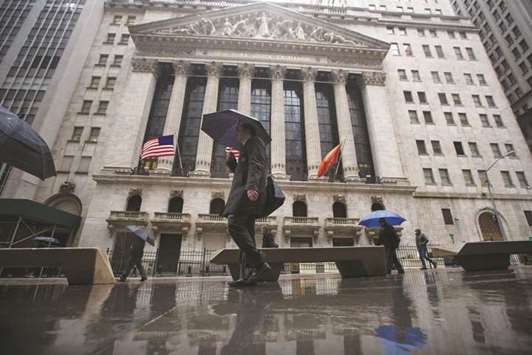The UN and Wall Street are farther apart than they appear on a map of New York City. Stress is running high this week at First Avenue and 42nd Street, home of the UN. Down near Manhattan’s southern tip, there’s nothing but smiles at the New York Stock Exchange. The S&P 500 Index and the Dow Jones Industrial Average set records again on September 19.
The world’s investors, not just those in New York, are pleased with the global economy, which the International Monetary Fund expects to grow 3.5% this year. JPMorgan Chase chief executive officer Jamie Dimon said September 19 in a conference call with reporters that “this is the first time in 12 years we’ve seen all the major countries of the world doing OK.”
And they’re serene in the face of threats that have the diplomats uptown shaking with fear - most notably the threat of a nuclear conflict emanating from North Korea but also Russian provocations along Europe’s eastern border, heightened tensions in the Middle East and the simmering naval conflict between the US and China in the South China Sea.
The Euro Stoxx 50 index has risen 7% this year through September 19, Japan’s Nikkei is up 6% and Hong Kong’s Hang Seng Index is up 28%. Remarkably, even South Korea’s benchmark KOSPI has gained 19% on the year. Meanwhile the dollar – which tends to rise in crises as investors seek a safe haven – is down 10% so far in 2017. Calm prevails.
One reason for the disparity is that many of the issues that preoccupy the UN don’t have immediate consequences for the corporate profits that underlie stock valuations. Famine in Africa, the Syrian civil war, the Rohingya refugee crisis, and Venezuela’s implosion are human tragedies more than macroeconomic events.
Another reason for the market’s serenity is that even the things that could put a serious damper on the global economy – like nuclear war – aren’t entering the value calculations of most investors. Because the risks are hard to measure and price in, investors are choosing to ignore them entirely, says Willem Buiter, the chief global economist of Citigroup.
Referring to Wall Street, Buiter says, “You can only understand the robustness of the euphoria in the US market by the complete denial of any of these geopolitical risks materialising.”
Ian Bremmer, president of Eurasia Group, a political-risk consulting firm, sees a yawning gap between the “transformational” opportunities presented by science and technology and the threats posed by geopolitics. “It’s very mixed for me,” says Bremmer. “Geopolitically this is by far the most dangerous environment I’ve ever lived in.”
Bremmer is participating in the inaugural Bloomberg Global Business Forum, sponsored by Bloomberg Philanthropies, featuring more than 50 heads of state and more than 250 chief executive officers. It’s one of a slew of events piggybacking on the annual meeting of the UN General Assembly.
Former president Bill Clinton, who used to run his own star-studded event during UN week called the Clinton Global Initiative, is among the Bloomberg event’s headliners.
Michael Froman, a distinguished fellow of the Council on Foreign Relations who was the US trade representative under President Barack Obama, says side events like Bloomberg’s that bring business people and non-profits into the mix are useful because “they demonstrate that it’s not just governments that are involved in these issues.”
And sometimes, the events even produce results. Obama’s Open Government Partnership, which helps domestic reformers make governments more responsive and has grown to include more than 70 nations, was hatched in 2011 at a side event to the General Assembly, Froman says.

Pedestrians walking past the New York Stock Exchange. The S&P 500 Index and the Dow Jones Industrial Average set records again on September 19.
